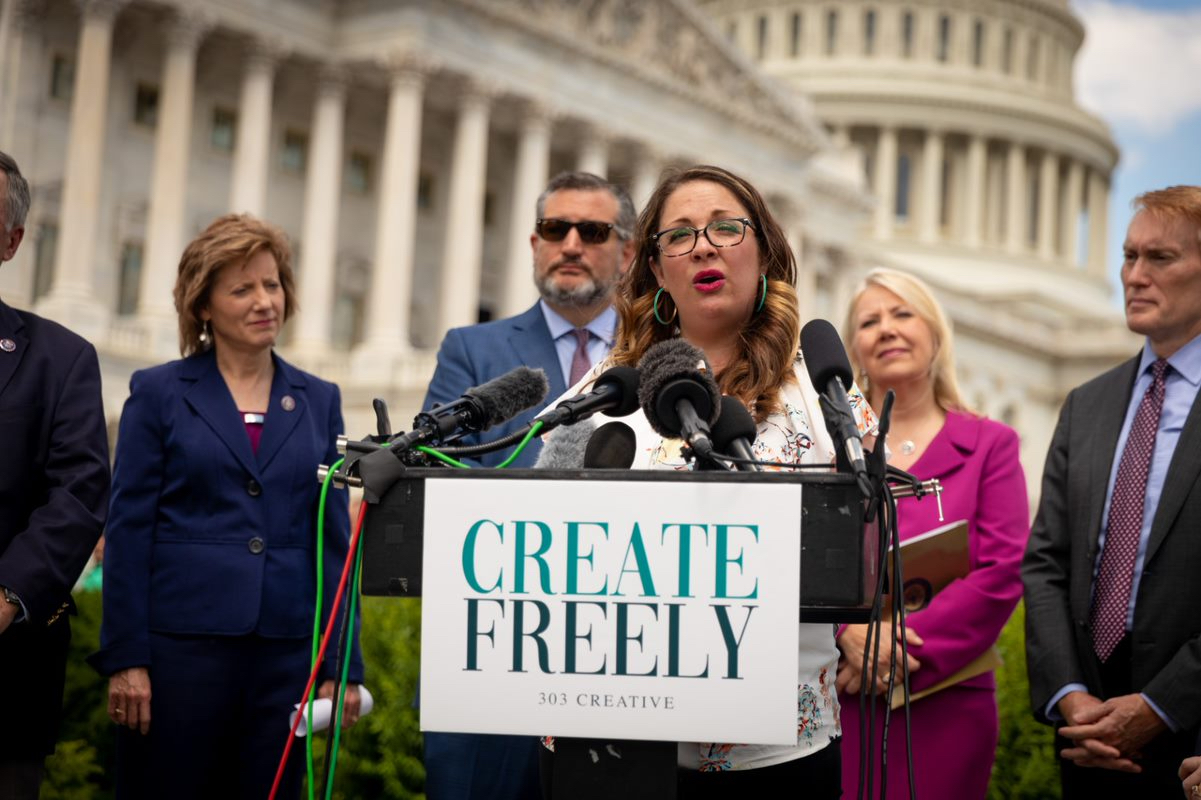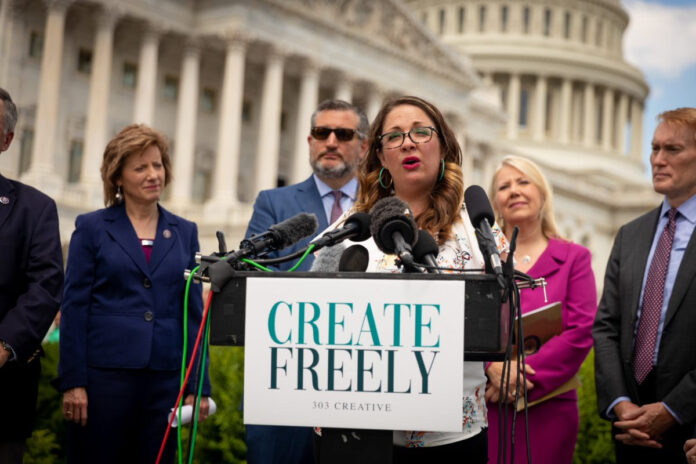CASE PREVIEW
on Dec 2, 2022
at 12:57 pm

Lorie Smith, the owner of 303 Creative LLC, speaking at a Capitol Hill press conference in June 2022. (Alliance Defending Freedom)
The Supreme Court on Monday will revisit a long-simmering tension between legal protections for LGBTQ people and the rights of business owners who oppose same-sex marriage. The case, 303 Creative v. Elenis, is a challenge by a Colorado website designer to a state law that bars businesses that are open to the public from discriminating against gay people or announcing their intent to do so. The designer, Lorie Smith, argues that subjecting her to the law would violate her right to free speech. Colorado counters that exempting Smith from the law would open a Pandora’s box that would “upend antidiscrimination law – and other laws too.”
The justices have already grappled with this question once. In 2018, the court handed a narrow victory to Jack Phillips, a Colorado baker who refused to make a custom cake for a same-sex couple because he believed that doing so would violate his religious beliefs. Justice Anthony Kennedy’s opinion rested largely on the majority’s conclusion that the Colorado administrative agency that ruled against Phillips treated him unfairly by being too hostile to his sincere religious beliefs. The opinion seemed to leave open the possibility that, in a future case, a service provider’s sincere religious beliefs might have to yield to the state’s interest in protecting the rights of same-sex couples, and the majority did not rule on one of the central arguments in the case – whether compelling Phillips to bake a cake for a same-sex couple would violate his right to freedom of speech.
Enter Lorie Smith, the owner of 303 Creative LLC, a designer of websites and graphics based in Littleton, Colorado. Smith is a devout Christian who believes that marriage “is only between one man and one woman.” So although Smith wants to expand her business to include wedding websites, she does not want to design websites for same-sex weddings, and she wants to post a message on her own website to make that clear.
In 2016, Smith went to federal court in Colorado, seeking a ruling that Colorado could not enforce its public-accommodations law, known as the Colorado Anti-Discrimination Act, against her because it would violate her First Amendment rights to free speech and free exercise of religion. When the U.S. Court of Appeals for the 10th Circuit rejected her arguments, Smith came to the Supreme Court. The justices agreed in February to take up her case – but only on the free speech question, not on the free exercise issue.
Smith’s arguments
In the Supreme Court, Smith’s argument is straightforward: Applying CADA to her would violate the First Amendment because it would require her to create messages that are inconsistent with her religious beliefs, and it would bar her from announcing those beliefs on her website.
Smith explains that she decides whether to take on a commission based on the message that the work will convey, rather than the person requesting it. This means, she says, that she would “happily” design graphics for an LGBTQ customer who runs an animal shelter. But she will not take on commissions that would be inconsistent with her Christian beliefs – including, she says, by promoting same-sex marriage – because a custom wedding website would “express approval of the couple’s marriage.”
Smith points to the Supreme Court’s 1995 decision in Hurley v. Irish-American Gay, Lesbian & Bisexual Group, holding that Massachusetts could not require the private organizers of Boston’s St. Patrick’s Day parade to allow an LGBTQ group to march in the parade. The group alleged that the failure to permit it to participate in the parade violated the state’s public-accommodations law. But compelling the organizers to include the group would violate the First Amendment, the court ruled. The parade organizers had the right to choose what message the parade conveyed, and that right included the ability to exclude contrary messages.
Under Hurley, Smith argues, courts must consider two questions: whether the service or good involved is speech or conduct; and whether the speaker’s message was affected by the speech it was required to accommodate. Both of those criteria are met in this case, Smith contends. The service at the center of the dispute is her design services, which are “pure speech,” and CADA requires her to change that speech “in untenable ways.”
Colorado’s arguments
Colorado makes an equally straightforward argument, albeit one that is diametrically opposed to Smith’s: CADA merely regulates sales, rather than the products or services being sold, and therefore does not require or bar any speech.
Public-accommodations laws like CADA, the state writes, follow “a common-law tradition that predates the Founding” and are intended to protect marginalized groups like LGBTQ people and racial minorities from discrimination in the marketplace. Such discrimination, the state explains, can create “wide-ranging” injury, from “the difficulties of finding a hotel while traveling” to “humiliation, frustration, and embarrassment” when a business refuses to serve someone.
CADA, the state stresses, does not require Smith to offer specific kinds of design services or bar her from including biblical quotes reflecting her view of marriage on any wedding websites that she might create. All that CADA requires, the state insists, is that Smith sell whatever products or services she decides to offer to anyone who wants to buy them. For example, the state suggests, CADA does not require a Hindu calligrapher to create flyers with a Christian message, but if a Hindu calligrapher does create such a flyer, the calligrapher must sell it to all customers.
The state points to Rumsfeld v. Forum for Academic and Institutional Rights, the Supreme Court’s 2006 decision holding that a federal law withholding some federal funding for colleges and universities that restricted the access of military recruiters to students did not violate the First Amendment. Just as in this case, the state argues, the court reasoned in FAIR that the law “regulates conduct, not speech” because it “affects what law schools must do – afford equal access to military recruiters – not what they may or may not say.”
Smith’s case is not comparable to Hurley, Colorado insists, because there were no sales involved in that case. Instead, the state observes, the dispute was over “private parade organizers’ decisions about who to include in their parade.” And as a result, the state reasons, the public-accommodations law in that case “altered the message that the parade organizers sought to deliver.”
Implications for religious rights and marginalized groups
Although the justices declined to review Smith’s claim that CADA violates her right to freely exercise her religion, both sides nonetheless argue that the court’s ruling will have a sweeping impact on religious rights. And numerous scholars and interest groups have weighed in on ramifications for disfavored populations.
Smith warns that allowing the 10th Circuit’s ruling to stand would mean that artists will be required to engage in speech that violates their conscience. Calligraphers who support abortion rights can be compelled to create flyers for anti-abortion activists, she says, and musicians who are atheists can be required to perform at religious ceremonies.
Smith adds that the state has other options to prevent discrimination without compelling or restricting speech – for example, by carving out an exemption from public-accommodation laws for the wedding industry, as Mississippi has done. The state could also limit the scope of CADA by, for example, limiting “public accommodations” to entities that provide essential services like food and lodging.
A “friend of the court” brief by a group of First Amendment scholars, led by Prof. Dale Carpenter of SMU Dedman School of Law, urges the justices to adopt a rule that, they say, will strike a balance between respecting the rights of LGBTQ people and protecting freedom of speech. Specifically, they say, the court should hold that anti-discrimination laws cannot compel speech related to weddings – for example, by website designers, photographers, painters, singers – but at the same time make clear that the providers of services that are not speech – such as bakers, limo drivers, and caterers – are not protected by the First Amendment.
Colorado counters that the exemptions that Smith and her supporters propose would “upend antidiscrimination law – and other laws too.” These exemptions would create “an enforcement regime riddled with uncertainty and inconsistency,” the state says, because Smith and her supporters offer “no meaningful standards” to determine what services are covered by an exemption. Allowing businesses an exemption based on the effect that a law would have on their message would, the state contends, allow businesses to opt out of public-accommodation laws for a wide variety of reasons, including racist, sexist, or anti-religious beliefs.
“Friend of the court” briefs supporting the state echo the state’s warnings. The carve-out from public-accommodation laws that Smith seeks, a brief by religious organizations cautions, “risks devastating consequences for all historically marginalized groups,” but particularly for religious minorities. A brief on behalf of LGBTQ service members notes that those service members and their families are often required to live in places where, without public-accommodations laws, they might be targets of discrimination that would strip away their access to important products and services. “If businesses do not want to serve certain groups,” the brief by religious organizations concluded, “then it is their prerogative to opt out of marketing goods and services to the general public.”
The Supreme Court has changed substantially since it gave Phillips a narrow victory in 2018. Kennedy, the author of the ruling, retired that year and was replaced by the more conservative Justice Brett Kavanaugh. And perhaps most notably, in 2020 Justice Amy Coney Barrett succeeded the late Justice Ruth Bader Ginsburg, cementing a solid 6-3 conservative majority. The decision to take up Smith’s case, combined with the court’s recent rulings expanding religious liberties, suggests that Smith may be on the verge of securing the broader victory that Phillips sought four years ago.
This article was originally published at Howe on the Court.





